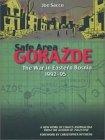A ler
Patrick Gaumer, Le Larousse de la bande dessinée

Correspondence Between Stalin, Roosevelt, Truman, Churchill and Attlee During World War II

Dietrich Schwanitz, Die Geschichte Europas

Dietrich Schwanitz, Bildung - Alles war man wissen muss

Niall Ferguson, Virtual History: Alternatives and Counterfactuals

Niall Ferguson, The House of Rothschild: Money's Prophets 1798-1848

Niall Ferguson, House of Rothschild: The World's Banker, 1849-1998

Joe Sacco, Safe Area Goradze

Joe Sacco, Palestine

Hugo Pratt, La Maison Dorée de Samarkand

John Kenneth Galbraith, The Affluent Society (Penguin Business)

Mary S. Lovell, The Sisters - The Saga of the Mitford Family (aconselhado pelo Jansenista)

Charlotte Mosley, The letters os Nancy Mitford and Evelyn Waugh (aconselhado pelo Jansenista)

Ron Chernow, Alexander Hamilton

Henry Fielding, Diário de uma viagem a Lisboa

AAVV, Budget Theory in the Public Sector

JOHN GRAY, Heresies: Against Progress and Other Illusions

CATHERINE JINKS, O Inquisidor, Bertrand, 2004

ANNE APPLEBAUM, Gulag: A History of the Soviet Camps, Penguin Books Ltd, 2004

António Castro Henriques, A conquista do Algarve, de 1189 a 1249. O Segundo Reino

Philip K. Dick, Ã espera do ano passado

Richard K. Armey e Dick Armey, The Flat Tax: A Citizen's Guide to the Facts on What It Will Do for You, Your Country, and Your Pocketbook

Jagdish N. Bhagwati, In Defense of Globalization, Oxford

Winston Churchill, My Early Life, Eland
 A ver
A ver
Eraserhead (um filme de David Lynch - 1977)

Eraserhead (1977)

Nos meus lábios, JACQUES AUDIARD, 2001

A Tua Mãe Também, ALFONSO CUARON, 2002

Pickup on South Street, SAMUEL FULLER

The Bostonians, JAMES IVORY (real.)

In the Mood for Love, KAR WAI WONG, 2001

 O Impecável
O Impecável






























